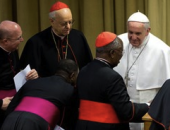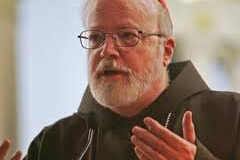Consistory: reform will strengthen credibility of the Church

The Extraordinary Consistory of the College of Cardinals with Pope Francis met on Thursday in a "serene and constructive atmosphere" with interventions by 28 cardinals who offered different perspectives on the reform of the Curia, focusing on the relationship between the Curia and the local Churches, and underlining the importance of better serving the Church in the world. They spoke of “decentralisation”, and the theme of “subsidiarity” was recurrent. Further reflection was invited on what can be done better and where: or rather, in which cases it would be more useful for the Roman dicasteries to act, and when instead the involvement of the dioceses or the episcopal conferences would be more useful.
Other interventions were dedicated to the usefulness and importance of the central service of the Holy See, bearing in mind the experience in various countries where the local church is weak and may be subject to pressure, and is therefore supported by the work of the Vatican.
Coordination within the Curia was addressed not with a merely functional focus, but rather from the perspective of a sense of communion between the different dicasteries, of communication that creates union in the common mission. More specifically, the interministerial commissions were referred to as tools for achieving this objective and the importance of continuity in this dimension of coordination was noted.
Emphasis was placed on the competence of the Secretariat of State with regard to the Holy See's relations with international organisations and entities as a guarantee of coherence and the assumption of a common position. However, this does not mean that the Secretariat of State acts alone, but rather that it involves the dicasteries with specific competences, always with a guiding unity.
Simplification is a shared criterion. There were several considerations regarding the qualifications of people working in the Curia, from the point of view of professional competence and ecclesial spirit and dedication. Emphasis was placed on the need for professionals from different parts of the world and for the Church to better reflect her universality. In this respect, there was discussion on the role of the laity, women in particular, in the assumption of positions of responsibility in the Roman Curia.
Other interventions focused on the positive elements of the Apostolic Constitution “Pastor bonus”, which must not be lost from view; therefore, the reform process must ensure distinct continuity with this document, especially from an ecclesiological point of view.
Friday morning's meeting, attended by 164 cardinals, focused primarily on a long report with four interventions on themes of an economic nature, introduced by Cardinal George Pell, president of the Secretariat for the Economy. Joseph FX Zahra of the Commission for Reference on the Organisation of the Economic and Administrative Structure of the Holy See (COSEA) then spoke about the study the Commission carried out last year on the organisational issues faced by the Holy See, and gave information on the Commission's activity. It was the first time that the College of Cardinals has received such a detailed report in the presence of so many cardinals. The composition, role, work and competences of the Council for the Economy were then the subject of an intervention by Cardinal Reinhard Marx.
Cardinal Pell then gave further information regarding the recent activities of the Secretariat, focusing primarily on the balance for the year that has just commenced. Finally, Jean-Baptiste de Franssu, president of the Institute for the Works of Religion (IOR) spoke about the current situation of this body.
Following the interventions by the cardinals, several questions were raised to the speakers. As well as asking for more specific details, the cardinals expressed their appreciation for the reorganisation work that has taken place and their conviction that this constitutes a convincing reform that prioritises transparency, integrity and competence. The speed with which it has been put into affect was also praised, given that there are already entities working according to the new guidelines. The reforms, it was affirmed, strengthen the credibility of the Church.
Questions of a more technical nature were also posed, regarding the competences of various bodies and the relations between the Holy See and Vatican City State.
The Consistory did not complete its work on Friday morning as expected. The meeting continued during the afternoon, with an update on the work of the Commission for the Protection of Minors by its president, Cardinal Sean O'Malley.
Source: VIS


















